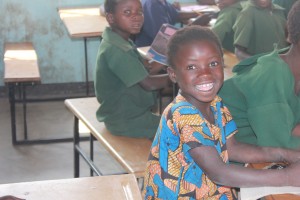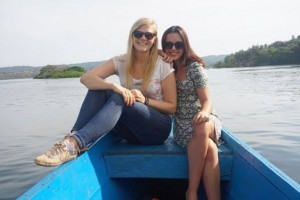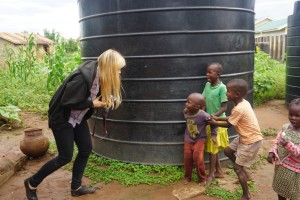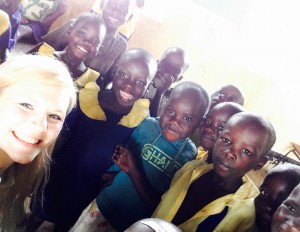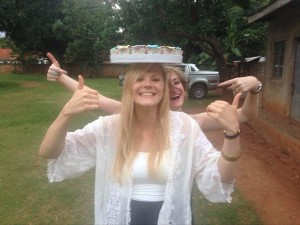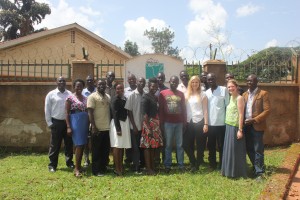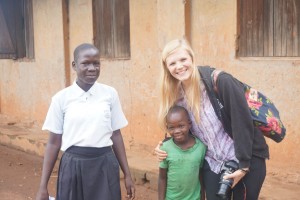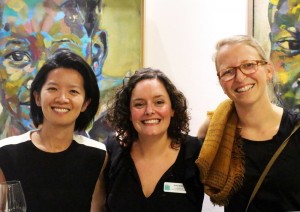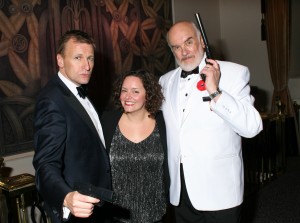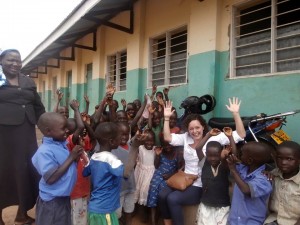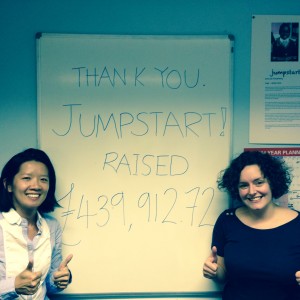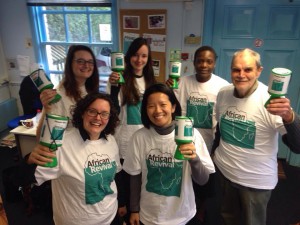School Demonstration Gardens: High hopes for 2016!
January 27, 2016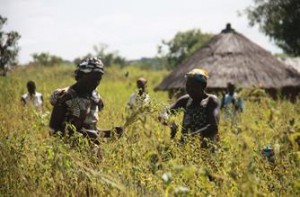 At the end of 2015, we distributed the first proceeds from our School Garden project amongst members of the parents’ groups. While the groups encountered challenges throughout the year, particularly from a prolonged drought which affected crop yield, they still succeeded in generating a good profit from their farming activities. A portion of the money was reinvested back into the garden and school, and the rest shared between the group members.
At the end of 2015, we distributed the first proceeds from our School Garden project amongst members of the parents’ groups. While the groups encountered challenges throughout the year, particularly from a prolonged drought which affected crop yield, they still succeeded in generating a good profit from their farming activities. A portion of the money was reinvested back into the garden and school, and the rest shared between the group members.
At the start of the project, each member set savings goals for their profits. Most members included paying their children’s school fees as a top priority, as well as saving for future medical needs and investing in their home farming or business. Bosco, part of the marketing team at the Lujoro Primary School Demonstration Garden, hopes to use the profits to increase his agricultural productivity at home in 2016:
“I will use part of the money to buy two pigs. So I will be keeping pigs. And also part of the money I will use to pay the exam fees for the children.”
Alice, a member of the parents’ school garden group at Labala Primary School told us:
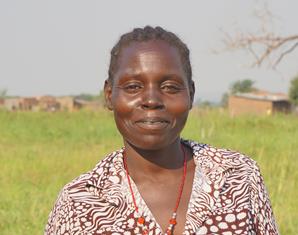 “My wish for 2016 is this. I want to change from this humble farming (by hand) to some simple machine techniques, where I use a cow to plough. I want to be a commercial farmer.”
“My wish for 2016 is this. I want to change from this humble farming (by hand) to some simple machine techniques, where I use a cow to plough. I want to be a commercial farmer.”
As well as determining the best use of their profits, parents’ groups have been busy choosing which crops to plant this year and planning their farming activities to ensure that they maintain a high level of productivity. We wish them the best of luck in 2016 and hope they enjoy fruitful harvests!
Posted in News | Leave a commentWelcome Cara!
January 6, 2016Today we are absolutely thrilled to welcome Cara Shaw as our new Fundraising & Communications Field Officer!
Cara joins us for six months in our Gulu office (Uganda), where she will be helping with proposal writing, reporting, and communications. She has a degree in International Relations and Development Studies from the University of Sussex and has worked in fundraising, communications and programmes roles in the international development sector for the last two years.
Keep an eye on our website and social media for her photos and reports from our projects in Uganda!
Posted in News | Leave a comment£9,354 raised on the Big Give Christmas Challenge!
December 7, 2015Thank you SO, so much to everyone that donated to us on the Big Give Christmas Challenge over the weekend! We were completely taken aback by the level of support given, from both new and previous supporters, with almost everyone getting their donations in on time to get them doubled!
These funds will have such a huge impact at Sikalele Community School in southern Zambia when we start work there in the New Year. Thank you.
If you didn’t get a chance to donate over the weekend, but would still like to support the project, you can still donate through the Big Give until the 14th December 2015. You can also click here to find out more about the project at Sikalele.
Posted in News | Leave a comment
The Big Give Christmas Challenge!
December 3, 2015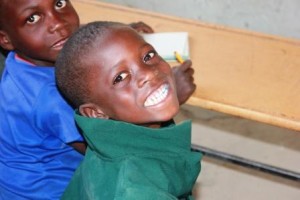 African Revival has been selected to be part of the Big Give Christmas Challenge 2015!
African Revival has been selected to be part of the Big Give Christmas Challenge 2015!
This is the largest match-funding campaign in the UK and it’s a great opportunity for us to raise funds and let people know about our important work.
Donate online via the Big Give Christmas Challenge, starting this Friday 4th December, and your donation to African Revival could be doubled! Doubling is on a first-come-first-served basis so make sure to get your donation in quick when the challenge opens at midday.
Many thanks in advance for your support – you are helping to give thousands of children a brighter, better future.
Please help us provide latrines, hand-washing facilities and teaching and learning materials at Sikalele Community School in Zambia by donating online through the Big Give Christmas Challenge on the 4th and 5th December 2015.
Want to know more about the project or the challenge itself? Just follow these links:
Posted in News | Leave a comment
I want to become someone who can formulate policies…
November 27, 2015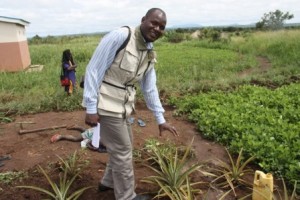 We have recently heard from Francis,our Livelihood Programme Coordinator, about working for AR and our SDG programme. Keep reading, if you like to find out more about Francis himself!
We have recently heard from Francis,our Livelihood Programme Coordinator, about working for AR and our SDG programme. Keep reading, if you like to find out more about Francis himself!
Originally my district is Nwoya district, Koch Goma. I started primary school in Koch Goma, Koch Goma P7 actually, that was around 1985, I was about 5 years old. Then I came to Gulu, P1, I was 6 years old. I went to Negri Primary School, it’s a boarding primary school, private, much better – that’s were I completed my primary 7. And then again, I went to Negri College, it is also a boarding secondary school. And then I went for institution, for Diploma, in Agricultrue, at Bukalasa Agricultural College. The diploma was 3 years and I did it in ‘Farm Management’. Then Uganda Matyrs University, in Kampala, for degree, 4 years – and I majored in Organic Agriculture (BSC).
I completed in real time, I did not repeat a class – although of course there were challenges! Sometimes, between O-level and A-level, there were challenges with school fees to the point that in my A-level year, I had to start studies in the second term. I couldn’t do the first term, I had to go to second term. That was hard. And when I finished S5, when I was promoted to S6, the school did not offer agriculture, which I was pursuing. So I had to go and sit in another school, I didn’t want to lose a year, and I didn’t lose a year. So every level I completed in real time, no lost years – that was what I wanted.
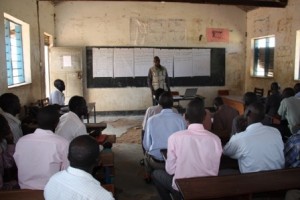 I want to do master degree, in Agro-Ecology. It’s about the variety of plants and animal species and how they interact with the environment. So it is about manipulating the environment to produce better yields, for crop varieties and animal products. So it suits in the context of climate change – when the climate is not favourable how do you adjust the technology to suit production.
I want to do master degree, in Agro-Ecology. It’s about the variety of plants and animal species and how they interact with the environment. So it is about manipulating the environment to produce better yields, for crop varieties and animal products. So it suits in the context of climate change – when the climate is not favourable how do you adjust the technology to suit production.
I want to do this next year – it is a weekend programme, so I do it along side the work. I will have no free time and during the leave I should be going for examination, but with proper planning and organisation, I think it is possible – and some extra effort.
With this master degree, I want to pursue my career in agriculture, and really be a professional all around agriculturalist, with background knowledge on every sector of agriculture, whether it is traditional agriculture, conventional agriculture, organic agriculture – so that I am an expert, in the field agriculture and can be consulted at any level, when it comes to agriculture. But also more for to be relevant in the job, in the employment work, because I know you cannot get certain high profile jobs, with a bachelor degree. But once you have the master degree, you are eligible to apply and get a better job, high paid and also, even in the international area. But I am not planning to go away, but I would want the opportunity, if it arises to work with an international NGO, but within my country. I can go for a few days, just for orientations and induction, and experience sharing, but I want it based here, in Uganda – and cause change in the country I live and come from.
Once I am done with my masters degree and had some more experience with international organisations, working in relation to agriculture, I want to apply and join the government, the agricultural ministry – and be a secretary under the minister of agriculture, within in Uganda. So I want to work with the ministry of agriculture, at the end of the day.
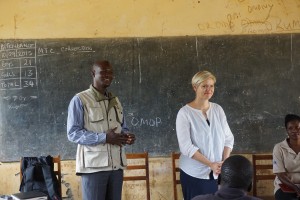 I want to become someone who can formulate policies that give best practices, which farmers can adhere to, and then increase on household and country food security. And I think it is necessary, because looking at our country Uganda, it is heavily depending and relying on agriculture, but the sector is below its potential to bring out the people out of poverty and also to produce enough food to feed the population and also export enough.
I want to become someone who can formulate policies that give best practices, which farmers can adhere to, and then increase on household and country food security. And I think it is necessary, because looking at our country Uganda, it is heavily depending and relying on agriculture, but the sector is below its potential to bring out the people out of poverty and also to produce enough food to feed the population and also export enough.
I would emphasis on extension services and provision: Agricultural trainers who should be down with the farmers to give them advice on what to grow, how best to grow them, how to control pest and diseases and how to rotated their crops, and how to adjust to changes in climate conditions – this gap is currently eminent. If the agricultural extension workers are not there to pass on, to translate this good research information to the farmers, that means there is that gap of technology transport from the researchers to farmers. So you can imagine if that gap is there, that means farmers are not having knowledge, because there is no technical training giving to them, with the exception of course of the few NGOs, like what we are doing with the SDG – that is an add-on to the communities we are working with, but we can only reach a few! That means the entire country, and where such interventions are not there, are missing out.
There are two basic things I do in my free time at the moment. One is productive, something that can generate income, and then something to organise myself better. Something to add onto my income or production capacity, I can be working in my small farm or in the gardens, producing crops. I have a two acres land which I put to good use every year and every season. This means I grow crops every year. And this year around I planted also to basic types of crops, I planted cassava in one acre and then I planted beans in the other acre. The beans are ready and due for harvest – the beans, I am going to store for food security or consumption. But the cassava, I am going to sell part of it and earn some income.
And then the other one, to develop and write up some proposals for business, farming business,like simple proposal on small income generating activities – l I wish to raise the capital locally, finance it within family and friends – it is not a very high capital business. So I hope to raise the capital locally and then start operating the business also slowly, and then when it picks up, then we can expand.
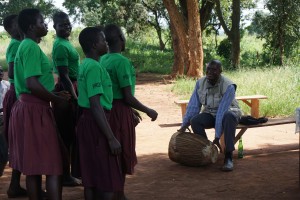 I want to scale up and open a model farm. At least 10 acres and integrate life stock and crops. A model farm means, I want to establish a job centre for learning and exposure of other farmers to learn the best practices from Francis Farm – and then master the art of good agriculture. So this is going to be, partially as a learning exposure for training, but also as a business venture, generating income. That’s where I intend to spend all my time, if I leave the regular job.
I want to scale up and open a model farm. At least 10 acres and integrate life stock and crops. A model farm means, I want to establish a job centre for learning and exposure of other farmers to learn the best practices from Francis Farm – and then master the art of good agriculture. So this is going to be, partially as a learning exposure for training, but also as a business venture, generating income. That’s where I intend to spend all my time, if I leave the regular job.
Goodbye Alex!
November 27, 2015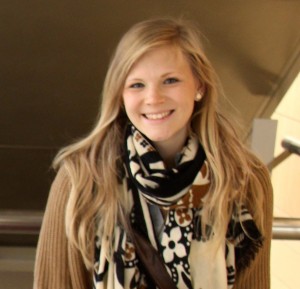 It’s another sad day for us at African Revival, as today we say goodbye to our fabulous Fundraising & Communications Field Officer in Gulu, Alexandra Fortacz!
It’s another sad day for us at African Revival, as today we say goodbye to our fabulous Fundraising & Communications Field Officer in Gulu, Alexandra Fortacz!
Alex joined us in May this year for a 6 month placement after studying Political Science in Vienna and Nottingham and volunteering in South Africa. From the moment she joined the team, she has been an absolute pleasure to work with, with her dedication to the cause, enthusiasm and creative flair – no task has been too much and she has risen to every challenge in her way.
Alex has spent her time in Uganda on countless field visits out to our partner schools, interviewing students, parents, teachers and members of communities we work with, writing detailed and engaging reports, and keeping the whole African Revival team (across three countries!) updated with news and photos from our work in the field. As you’ll see from some of our favourite ‘Alex moment’ photos below, she’s also found time to make lots of great friends too!
She has made a genuine impact on the work we do and we are so lucky to have had her with us for the last six months. We’ll miss you Alex – thank you for everything!
Posted in News | Leave a comment
Inspiring next generations
November 26, 2015At Morulem Primary school in Abim district, Peter teaches agriculture, mathematics and religious education (RE) and is the focal teacher of the LEARN pupils entrepreneurship club in which, as Peter explains:
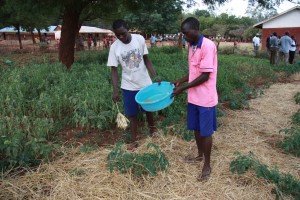 They learn agriculture skills which is definitely important, in the way that, now we sometimes find that not all children may complete primary levels, or even go to senior school. They may not complete. Now as a child, after learning, these agricultural skills, you will transfer it back home, so much so that even at the moment, so much that when you go home, you will not be redundant, just keep on having your nursery bed, transplanting, caring for, and eventually you will sell and get some money in order to help you next time. And actually that is the purpose, the reason why they are supposed to be taught these skills. So much that tomorrow after schools, they go and use it at home.
They learn agriculture skills which is definitely important, in the way that, now we sometimes find that not all children may complete primary levels, or even go to senior school. They may not complete. Now as a child, after learning, these agricultural skills, you will transfer it back home, so much so that even at the moment, so much that when you go home, you will not be redundant, just keep on having your nursery bed, transplanting, caring for, and eventually you will sell and get some money in order to help you next time. And actually that is the purpose, the reason why they are supposed to be taught these skills. So much that tomorrow after schools, they go and use it at home.
However, Peter also speaks from experience, which he also often shares with his pupils in order to make them realise of the importance of agricultural skills:
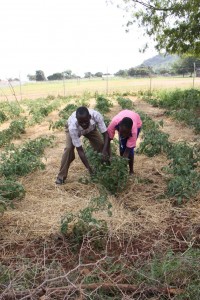 Me personally, in my mothers home, we were not able to go to school. I gave the pupils an example of myself. I said, I first started my life, as to look for money, by growing potatoes. After growing potatoes, I sold them, after selling I could save the little I get. Not only potatoes, from potatoes I went to maize, from maize I went to cassava; form cassava, I went to simsim. That’s why I decided now to go to school. Then I said, in the very way, I am telling you this story today, learn form it, because you will benefit from it later. Don’t be lazy! God has never created anybody lazy. Lazy is just something you say, like ‘ah tomorrow I will do, tomorrow I will do” – but you need to mean it! When you are saying you are going for this, go for it! – because later, in time to come, you will benefit from it. Actually that’s why some of them when they see me talk, they say “hey sir is it true?” And I say “Yes, I started from nowhere and that’s how I became a teacher!” If I were to sit without doing anything – in fact, personally I had no clothes when I was from P1-P3. I had no clothes completely. I had a small piece like this in front of me like. That’s why when I went and told them my story, my experiences, they were laughing. That’s why some of them said “from here, we shall not stop here. I am going to, we shall take whatever I have learnt from here.”
Me personally, in my mothers home, we were not able to go to school. I gave the pupils an example of myself. I said, I first started my life, as to look for money, by growing potatoes. After growing potatoes, I sold them, after selling I could save the little I get. Not only potatoes, from potatoes I went to maize, from maize I went to cassava; form cassava, I went to simsim. That’s why I decided now to go to school. Then I said, in the very way, I am telling you this story today, learn form it, because you will benefit from it later. Don’t be lazy! God has never created anybody lazy. Lazy is just something you say, like ‘ah tomorrow I will do, tomorrow I will do” – but you need to mean it! When you are saying you are going for this, go for it! – because later, in time to come, you will benefit from it. Actually that’s why some of them when they see me talk, they say “hey sir is it true?” And I say “Yes, I started from nowhere and that’s how I became a teacher!” If I were to sit without doing anything – in fact, personally I had no clothes when I was from P1-P3. I had no clothes completely. I had a small piece like this in front of me like. That’s why when I went and told them my story, my experiences, they were laughing. That’s why some of them said “from here, we shall not stop here. I am going to, we shall take whatever I have learnt from here.”
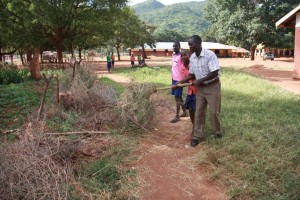 Peter’s own ambition and motivation that not only enabled him to go to school, but also his siblings, as he soon paid their school fees too, is inspiring the next generation through African’s Revial LEARN School Demonstration Garden Programme at Muorulem School – And the children are responding well to it – Peter says:
Peter’s own ambition and motivation that not only enabled him to go to school, but also his siblings, as he soon paid their school fees too, is inspiring the next generation through African’s Revial LEARN School Demonstration Garden Programme at Muorulem School – And the children are responding well to it – Peter says:
“They are willing and committed. Whenever there is no rain, if there is no rain, children will water twice a day. Even now, there are still watering.”
However, Peter is not only motivating its pupils to put in some extra hours, but also keeps an eye on gender equality. He has implemented a buddy system where everyone has do to everything, so that everyone will know how to do everything:
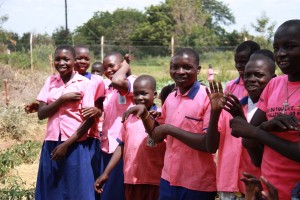 The girls are pairing up with the boys. They look at a boy as their brother, they look at a girl as their sister. Actually when we sit together with them, we talk right from down up to up. Before we start any doing, anything, watering etc., we distribute the work, to the girls or the boys – but let us not say this is for the girls, this is for the boys, no! Let us handle all this tasks together! If the boys are supposed to pump water, the girls are supposed to water. If the girls are supposed to pump water, the boys are supposed to water. They do it comparatively.
The girls are pairing up with the boys. They look at a boy as their brother, they look at a girl as their sister. Actually when we sit together with them, we talk right from down up to up. Before we start any doing, anything, watering etc., we distribute the work, to the girls or the boys – but let us not say this is for the girls, this is for the boys, no! Let us handle all this tasks together! If the boys are supposed to pump water, the girls are supposed to water. If the girls are supposed to pump water, the boys are supposed to water. They do it comparatively.
And since they share the work, they will also share the profits of their harvests:
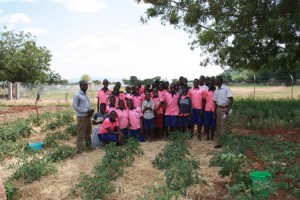 The children say that when they get some money, they share together. So what we did with the first profits? Immediately, when I saw that some club members, some pupils within the club had no pens, had no books, we decided to buy and we give to them. I will always tell them, since I am also a member with the community, a member of the saving group of the community, I will also say that the part of it which is remaining, they shall not share it all, but give it to the saving group for the children, so much so that next time if there is going to be nothing completely for starting, we shall begin with it.
The children say that when they get some money, they share together. So what we did with the first profits? Immediately, when I saw that some club members, some pupils within the club had no pens, had no books, we decided to buy and we give to them. I will always tell them, since I am also a member with the community, a member of the saving group of the community, I will also say that the part of it which is remaining, they shall not share it all, but give it to the saving group for the children, so much so that next time if there is going to be nothing completely for starting, we shall begin with it.
Peter is clearly thinking ahead, because the official LEARN School Demonstration Garden Project will come to an end in November 2015. Saving some of the profits for the next planting season will make sure that Peter will be able to empower more of his students!
Posted in News | Leave a commentThe future is bright…
November 25, 2015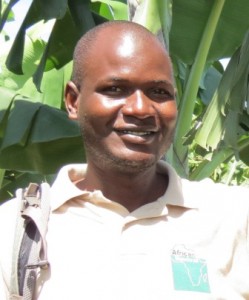 Francis is our Livelihood Project coordinator. He joined AR about 4 years ago after working for the Norwegian Refugee Council(NRC) where he also worked on food security and livelihood projects. As he quickly rose from a project assistant to the team leader, he was able to put his management skills to the test before coming to AR in in 2011/2. Back then, when his contract with NRC ended…
Francis is our Livelihood Project coordinator. He joined AR about 4 years ago after working for the Norwegian Refugee Council(NRC) where he also worked on food security and livelihood projects. As he quickly rose from a project assistant to the team leader, he was able to put his management skills to the test before coming to AR in in 2011/2. Back then, when his contract with NRC ended…
I was looking for a job, but there was also the interest to develop the organisation in other dimension. I knew the organisation more as an institution that works with education primarily – so when the job advertisement came for the livelihood department, I found it was a good opportunity to also diversify and also expand on the scope of activities of the organisation, to the areas also of livelihoods, and specifically where extensive agriculture can be practised and integrated in the work that African Revival is doing.
AR is a great organisation. In size and scale of implementation, I see it growing and developing, compared to the time when I joined. So I think it is a good thing to be in the organisation and also to be offered the opportunity to grow and also develop together with the organisation which is one thing I like, compared to another organisation where you go, and it’s already grown and there is no room for expansion, no new concepts, no ideas, no new project, no new innovations – I think I wouldn’t want to work for such an organisation. I prefer growing and developing an organisation, like this one.
I have managing roles, I have technical roles, and then I also have supervisory roles. In my general role, I have to manage, human resources and non-human resources. So I coordinate and supervise field staff and I manage financial resources, ensuring that budgets that are located for activities are handled accordingly. It’s a day-to-day role that I do and I enjoy doing it, especially with staff who are also willing and are very positive towards work.
In my technical roles, by the virtue of my training as an agricultural expert, I make sure that, I monitor the quality of the services delivered by the field staff to the beneficiaries. If it is training on agriculture, I contribute towards designing and drafting the training materials, and then ensure that he trainings are delivered accordingly. If the training requires practical session, I also take part in the demonstration by supervising. If the field staff needs to be supported, then I also come, if there is a technical area which surpasses their understanding and field of expertise.
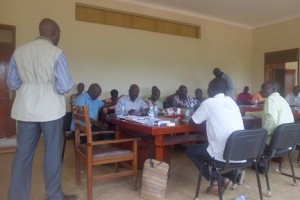 And then also I manage the different partnerships which African Revival has with the different stakeholders, for example, with the district, local government, where we are implementing our projects.
And then also I manage the different partnerships which African Revival has with the different stakeholders, for example, with the district, local government, where we are implementing our projects.
My staff are very hard-working, very competitive and very innovative. So they are actually the basis for the success of the school gardens projects. I enjoy a lot working with them and again, they also enjoy a lot their work. It is very much beneficiary and very resourceful team of staff, that I am working with and I am proud.
And currently our staff, Babra and also Bosco are pursuing further studies. They are getting more professional qualifications – Denis was recruited with a certificate, so now he’s upgraded to a Diploma holder. Babra was recruited from Diploma, now she is upgrading to a degree – which are all very good development upgrades. And at one point they had to ask for my endorsement and recommendation to add onto their cover letters for admission to the universities and institutions. So I am also happy to be part of their personal developments, which I know is going to contribute to their performance in delivering the project implementation to the beneficiaries.
When it comes to challenges, there is none other than field challenges which are the things that we have to deal with on a day-to-day basis, on a week-to-week basis, issues of crops not performing well, issues of pest and diseases and issues of weather changes.
But of course one thing is very apparent: funding is key – that I cannot underestimate. So where funding sources are limited, also the activities, the scale and also the geographical location, where we have to implement is limited, and that means we cannot expand and grow a lot, which is for me a bit frustrating,
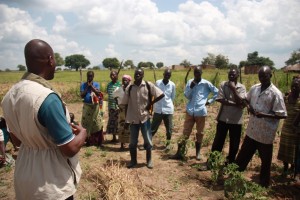 About the SDG project, it’s a very good project, and compared to the many projects that I have worked with, this has a unique benefit which is both for primary and also secondary – It has the multiply effect! So the greater part of it is the element of empowerment of the parents, the community and also the pupils.
About the SDG project, it’s a very good project, and compared to the many projects that I have worked with, this has a unique benefit which is both for primary and also secondary – It has the multiply effect! So the greater part of it is the element of empowerment of the parents, the community and also the pupils.
When I look at the communities especially the parents, the support we give them through the trainings and then the seeds support for agriculture production and also the initiation of VSLA, gives them the means to become self-reliant and then take charge of their household incomes, their household food security and also their dependants – in which case, the dependants here, our target and interests are on the learners, which are the pupils. So with this project, that empowers the parents to earn money, to grow enough food which can support their family and pupils perform better, is the perfect strategy or methodology for me, that works in a school community.
But also, the other benefit is, that it also targets the pupils directly, they’re also equally empowered with the life skills of farming, so that in the event, they do not get adequate support from the parents, they can pick up from a level that is not completely zero, they at least have a reference point to start from – or if in the event their education does not go as planned, they have a fall-back position: they can resort to farming and with the knowledge of entrepreneurship, farming as a business, they can make money, they can live their own lives, they can become mostly self-reliant and will seize to be completely dependent on other people.
So I would say the project is achieving it’s objectives, but also at the same time growing. Based on the good performance and the successful implementation, it was funded again in Nwoya for another year, and then in Abim and Agago for two years! And then building on the successes again, the idea was accepted by Bestseller Foundation for Amuru. So for me this is proof of the success of the project and also a success story that we can say and live to build on, and then scale out to the other districts which have not yet had the opportunity to benefit from this project!
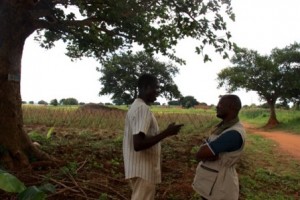 Sustainability is an issue, but the project is sustainable even if we leave. It is about the engagement of the various stakeholders and then ensuring that they play their roles. Like this project is dependent on the school, and the key stakeholders are the parents, the teachers and then the pupils. So if these people are engaged and properly oriented on how they should handle the project, I have no doubt that sustainability is not an issue. And there is a percentage which, we call group development fund, 30%, which is retained by the group for the school demonstration gardens, that they use to renew the seeds to redo themselves for subsequent seasons, especially now that we are not supporting them.
Sustainability is an issue, but the project is sustainable even if we leave. It is about the engagement of the various stakeholders and then ensuring that they play their roles. Like this project is dependent on the school, and the key stakeholders are the parents, the teachers and then the pupils. So if these people are engaged and properly oriented on how they should handle the project, I have no doubt that sustainability is not an issue. And there is a percentage which, we call group development fund, 30%, which is retained by the group for the school demonstration gardens, that they use to renew the seeds to redo themselves for subsequent seasons, especially now that we are not supporting them.
But most important is the integration of the school demonstration gardens into the school development plans – which is actually the gateway to the sustainability of the school gardens, because the school development plans is the major framework of any development activities in the school and it also has the capacity to allocate resources including financial resources to all these activities. So where we have been, we recommended this and in some schools we helped the schools to integrate the SDG into the school development plans, so that during their annual general meetings, they allocate funds to renew the gardens work when there is no support from us.
In Nwoya, we monitored 15 and they were still continuing with the methodology and concept of the school demonstration garden. And the institutions and structure we built there already, the group structures with their memberships, their leaderships and also with the establishment of some perennial crops, like bananas, which keep fruiting year and year out, which has been well established and very successful. It is already a permanent garden, that keeps them coming back, even if they want to do otherwise. So the impression already and the work, which was done over the project time has lived to sustain itself in many of the schools.
Other than funding at the coordination level, there are no real challenges – the future is bright. This project, it has an unlimited and overwhelming demand from the beneficiaries, it is only resource limitation that makes us not meet those demands, but with even substantial or adequate funding, the future of this project is bright and we can reach and cause tremendous change in the school communities across the country, with specific concern to the northern district where there is a gap.
Posted in News | Leave a commentGoodbye Holly
November 20, 2015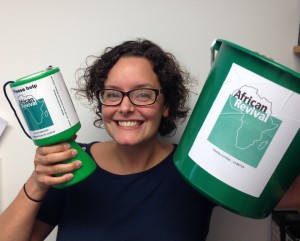 Today, we are incredibly sad to say goodbye to our amazing Fundraising & Communications Director, Holly Smith.
Today, we are incredibly sad to say goodbye to our amazing Fundraising & Communications Director, Holly Smith.
Holly joined African Revival in May 2014 after six years of dedicated community fundraising at Marie Curie Cancer Care. As soon as she arrived at AR, she got stuck straight in with her work and has consistently taken on challenge after challenge with enthusiasm, skill and her constant dedication to the cause – the communities we support in Uganda and Zambia.
It’s difficult to sum up the contribution that Holly has made to African Revival in the time she’s been with the charity. Let’s just say that organising two very successful fundraising balls at five-star London hotels and a Golf Day as well all taking care of all AR’s other events (on top of everything else she does!) is no mean feat! Not only that but Holly has also been a pleasure for all of us to work with, from staff and trustees to volunteers, beneficiaries and all manner of supporters.
Her dedication and positivity has been infectious to all of us and has made the AR working environment a fun, hard-working hub where all are inspired and encouraged to give their best. We have been extremely lucky to have her managing our fundraising, and have no doubt that she will continue to do brilliant things in her next role.
Here are some of our favourite Holly moments!
Putting on an amazing art exhibition of Zambian artist Emily Kirby’s work….
Hanging out with TWO hunky spies at the 2015 Savoy ball…
Getting to know some of the amazing children at our partner schools in Uganda…
Celebrating raising an astonishing amount for our first ever nursery education programme…
Hanging out in the UK office with the best team of volunteers on earth…
Thank You Holly! (And come back and see us soon!)
Posted in News | Leave a comment


